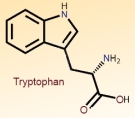Tryptophan and Sleep
You may not have heard a lot about tryptophan, but you probably consume it on a regular basis. It is one of 10 essential amino acids present in many of the foods people consume daily. Key to facilitating a number of the body's necessary functions, this amino acid is best known for its ability to help ward off depression, regulate your appetite, and improve sleep.
Food Sources
Chicken and turkey are two of the best sources of tryptophan in the animal world, but tuna, salmon and lamb are also rich in it. In addition, dairy products are a rich source, which is why the recommendation of drinking a glass of milk to induce sleep actually makes sense.
Vegetarians can get adequate amounts of the amino acid in their daily diets by eating soybean-based foods, as well as other legumes, seeds, and nuts.
Function
Tryptophan works by raising serotonin, the neurotransmitter that regulates sleep, mood and anxiety. A deficiency can lead to insomnia, poor dream recall, an inability to concentrate, irritability and mood swings.
Since serotonin also controls appetite, a lack of this amino acid could lead to overeating, cravings for carbohydrates, and weight gain.
An approved prescription drug in Canada, it is prescribed by doctors to help people to address a number of mood disorders, including depression. Although the effects are not as intense as other anti-depressants, it can still help ease emotional reactions by restoring the balance of serotonin and melanin in the brain. Restful sleep is a positive secondary effect.
What the Experts Say

In a study published in "The British Journal of Psychiatry," researchers discovered that patients who suffer from depletion of the amino acid in their bodies experience memory impairment, an increase in aggression, and a relapse of symptoms associated with depression and panic disorder.
This is especially true in cases where people had been treated with antidepressants and were feeling better. When they experienced a lack of tryptophan, all of their previous symptoms returned.
How Much Do You Need?
To improve sleep and even out your mood, make sure you’re getting enough of the amino acid in your daily food intake.
Guidelines suggest that women 14 years and older need 322 mg day, while men over 18 years of age need 364 mg per day.
Four ounces of turkey or shrimp, a cup of cooked soybeans, two cups of lentils or 4 oz. of halibut all contain more than 100 percent of your daily requirements.
Warnings
According to experts, it is likely impossible to overdose on foods rich in the amino acid. So go ahead and have that extra glass of warm milk, if you’re having trouble falling asleep.
If you’re considering taking the amino acid as a supplement (in pill form), talk with your doctor first – especially if you’re taking other prescription drugs for mood or sleep disorders. Common side effects of drug interaction include drowsiness, nausea and headaches.
Related Information
Natural Sleep Aids
Relaxation Techniques
Relationship Between Food and Sleep
Herbs that Relieve Anxiety
Sleep Inducing Foods
Music for Sleep
Sleep Music Studies and Tips
Melatonin and Sleep
Aromatherapy Guide
Aromatherapy Benefits
Back to Better Sleep Better Life HOME from Tryptophan and Sleep
Share Sleep Tips Do you have a great tip to share with others who are struggling with sleep? What works for you might help someone else. |



